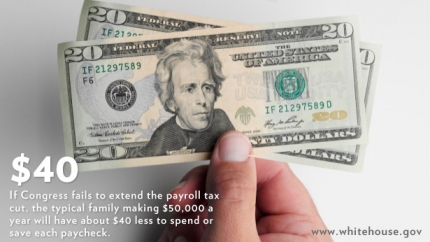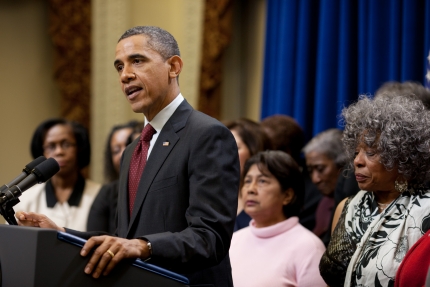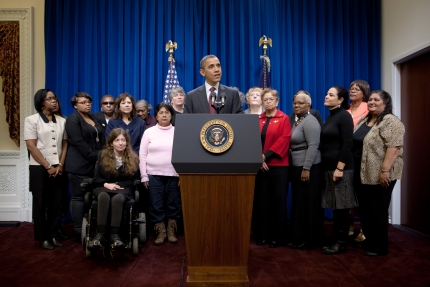Blog Posts Related to the African American Community
We Can't Wait to Help Young Americans Find Jobs
Posted by on January 5, 2012 at 10:41 AM ESTYour first job brings you more than just a steady paycheck – the experience teaches young people life and work skills that serve them long after the job is done. But as our nation continues to recover the deepest recession since the Great Depression, American youth are struggling to get the work experience they need for jobs of the future.
Today President Obama announced a new initiative, Summer Jobs+, that will make a difference.
“America’s young people face record unemployment, and we need to do everything we can to make sure they’ve got the opportunity to earn the skills and a work ethic that come with a job. It’s important for their future, and for America’s. That’s why I proposed a summer jobs program for youth in the American Jobs Act – a plan that Congress failed to pass. America’s youth can’t wait for Congress to act. This is an all-hands-on-deck moment. That’s why today, we’re launching Summer Jobs+, a joint initiative that challenges business leaders and communities to join my Administration in providing hundreds of thousands of summer jobs for America’s youth,” said President Obama.
Summer Jobs+ is a call to action for businesses, non-profits, and government to work together to provide pathways to employment for low-income and disconnected youth in the summer of 2012. The President proposed $1.5 billion for high-impact summer jobs and year-round employment for low-income youth ages 16-24 in the American Jobs Act as part of the Pathways Back to Work fund. When Congress failed to act, the Federal government and private sector came together to commit to creating nearly 180,000 employment opportunities for low-income youth in the summer of 2012, with a goal of reaching 250,000 employment opportunities by the start of summer, at least 100,000 of which will be placements in paid jobs and internships.
A centerpiece of the program will be the Summer Jobs+ Bank , a one-stop search tool for youth to access postings from participating employers that is targeted to launch in 60 days, which will use the same technology that powers the Veterans Jobs Bank that was launched late last year. Employers who want to offer opportunities to America’s young people can find out more here.
Learn more about EconomyPresident Obama and the First Lady Mark the Beginning of Kwanzaa
Posted by on December 27, 2011 at 11:15 AM ESTYesterday, the President and First Lady sent their warmest wishes to all those celebrating Kwanzaa this holiday season:
Today marks the beginning of the week-long celebration honoring African American heritage and culture through the seven principles of Kwanzaa -- unity, self determination, collective work and responsibility, cooperative economics, purpose, creativity, and faith.
We celebrate Kwanzaa at a time when many African Americans and all Americans reflect on our many blessings and memories over the past year and our aspirations for the year to come. And even as there is much to be thankful for, we know that there are still too many Americans going through enormous challenges and trying to make ends meet. But we also know that in the spirit of unity, or Umoja, we can overcome those challenges together.
As families across America and around the world light the red, black, and green candles of the Kinara this week, our family sends our well wishes and blessings for a happy and healthy new year.
By the Numbers: $40
Posted by on December 19, 2011 at 5:55 PM ESTIf Congress fails to extend the payroll tax cut, the typical family making $50,000 a year will have about $40 less to spend or save with each paycheck. Over the year, that adds up to about $1,000.
Opponents of the payroll tax cut dismiss its impact by insisting $40 isn’t a lot of money, but that’s not the case for many families who are already working hard to make ends meet. Forty dollars buys a tank of gas or a fridge and pantry full of groceries. It covers a water bill or the cost of a prescription.
Tell us what making $40 less each paycheck would mean for you and your family.
The payroll tax cut doesn’t just benefit the 160 million American workers who receive it, however. It also helps the economy as a whole. People spending money on goods and services generate business for stores and companies, who can then hire more workers, creating more jobs across the country.
President Obama says that this is a make or break moment for the middle class, and those trying to reach it. The defining issue of our time is whether we can build an economy where hard work pays off and responsibility is rewarded. And the President will continue to fight to make sure that working people can earn enough to raise a family, build a modest savings, own a home, and secure their retirement.
To make sure people here in Washington know that losing the payroll tax cut would affect people everywhere, tell us what making $40 less each paycheck would mean for you and your family. What would you have to give up or go without? Share your story here and add your voice to the debate.
Learn more about EconomyEnsuring Fair Pay for Homecare Workers
Posted by on December 15, 2011 at 3:15 PM ESTFour years ago, President Obama spent the day with Pauline Beck, a home health care worker. He followed her throughout her day -- as she got up at 5:00 in the morning to care for an 86-year-old amputee. He saw first-hand the demands of her work.
Their business is a growing industry -- one of the fastest in America. As the population of this country gets older, more Americans are turning to people like Pauline Beck to help make sure they have the care they need. And as the President said this morning, "As the homecare business has changed over the years, the law hasn’t changed to keep up." In the eyes of the law, homecare workers fall into the same category as a teenaged babysitter.
So today, the President did something to help homecare workers like Pauline Beck. He announced his support of a law to extend overtime pay protections and a guaranteed minimum wage to those who do this work:
We are going to make sure that over a million men and women in one of the fastest-growing professions in the country don’t slip through the cracks. We’re going to make sure that companies who do right by their workers aren’t undercut by companies who don’t. We’re going to do what’s fair, and we’re going to do what’s right.
Watch President Obama's full remarks here.
Learn more about Economy, Health CareWhite Board: Brian Deese on the Payroll Tax Cut
Posted by on December 14, 2011 at 9:01 AM ESTIn this new White House White Board, Brian Deese, the Deputy Director of the National Economic Council, explains how President Obama's payroll tax cut helps families, businesses, and the economy -- and why it's so important to extend that tax cut for 2012.
Watch the White House White Board video here.
Learn more about EconomyWhite House Honors Local Black Women Leaders as Champions for Change
Posted by on December 13, 2011 at 12:29 PM ESTOn Friday, December 9th, the White House honored twelve local leaders as White House Champions of Change in the effort to recruit and retain girls and women in science, technology, engineering, and math (STEM) fields. Among those who were honored as Champions of Change there are four remarkable African American women who are all active in the realm of academia, the community, public and private sectors. Earlier today these leaders, Bianca Bailey, Angela Byars Winston, Avis Yates Rivers, and Tamara Brown each discussed creative ways to inspire and encourage young and adult women on the careers and opportunities that are prevalent and available in the fields of science and technology. Each come from different stories and backgrounds; from currently attending college, work as a psychologist, CEO of a technology firm, and a founder of a local technology awareness program, all share a common thread in their passion to promote the sciences and progress for all women.
Many across the Washington area have been diligent in heeding the call to service and have dedicated their careers, time, and resources to ensuring women and girls are participating in the STEM fields. Of the honorees, the four African American women all have different backgrounds and have had the opportunity to reach out to underserved populations. Each have taken great strides to reduce the barriers that drive many girls and women to turn away from high-paying, highly rewarding careers as the Nation’s top innovators. They are each great examples of ordinary Americans taking action to encourage young girls and women to pursue careers in fields that have historically been occupied mostly by men. President Obama has urged every one of us to do our part to get America back on track and these women are outstanding examples of individuals helping to make changes in their community.
During the Champions of Change event, each shared their unique story and offered exceptional ideas for engaging women on being enthusiastic about careers in the STEM fields. They exemplify how so many Americans across the country are working individually and collectively to improve the disparities that persist within their communities. For many, simply having the dialogue will help improve the knowledge and understanding, and potentially open the window for consideration in these fields. Using these four African American women as examples, we can all do our part and support the promotion of young girls and women across America in the STEM fields and help to produce the Nation’s next top innovators.
- &lsaquo previous
- …
- 21
- 22
- 23
- 24
- 25
- 26
- 27
- 28
- 29
- …
- next &rsaquo


